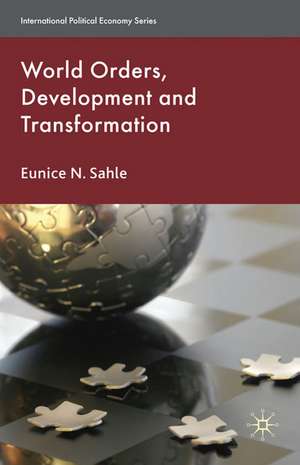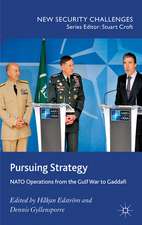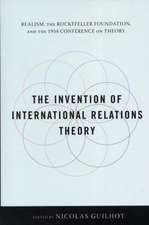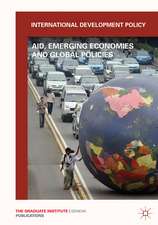World Orders, Development and Transformation: International Political Economy Series
Autor E. Sahleen Limba Engleză Hardback – 21 mai 2010
| Toate formatele și edițiile | Preț | Express |
|---|---|---|
| Paperback (2) | 383.93 lei 6-8 săpt. | |
| Palgrave Macmillan UK – 2010 | 383.93 lei 6-8 săpt. | |
| Palgrave Macmillan UK – 13 feb 2016 | 385.25 lei 6-8 săpt. | |
| Hardback (1) | 388.72 lei 6-8 săpt. | |
| Palgrave Macmillan UK – 21 mai 2010 | 388.72 lei 6-8 săpt. |
Din seria International Political Economy Series
- 9%
 Preț: 831.25 lei
Preț: 831.25 lei - 20%
 Preț: 751.84 lei
Preț: 751.84 lei - 17%
 Preț: 490.25 lei
Preț: 490.25 lei - 17%
 Preț: 363.48 lei
Preț: 363.48 lei - 20%
 Preț: 690.96 lei
Preț: 690.96 lei - 20%
 Preț: 627.55 lei
Preț: 627.55 lei - 9%
 Preț: 762.80 lei
Preț: 762.80 lei -
 Preț: 430.59 lei
Preț: 430.59 lei -
 Preț: 428.68 lei
Preț: 428.68 lei -
 Preț: 147.23 lei
Preț: 147.23 lei - 20%
 Preț: 566.64 lei
Preț: 566.64 lei -
 Preț: 385.08 lei
Preț: 385.08 lei -
 Preț: 389.11 lei
Preț: 389.11 lei - 15%
 Preț: 644.30 lei
Preț: 644.30 lei -
 Preț: 389.31 lei
Preț: 389.31 lei - 15%
 Preț: 644.30 lei
Preț: 644.30 lei -
 Preț: 413.84 lei
Preț: 413.84 lei -
 Preț: 387.38 lei
Preț: 387.38 lei - 15%
 Preț: 638.89 lei
Preț: 638.89 lei - 15%
 Preț: 644.63 lei
Preț: 644.63 lei - 18%
 Preț: 893.71 lei
Preț: 893.71 lei -
 Preț: 412.47 lei
Preț: 412.47 lei -
 Preț: 325.08 lei
Preț: 325.08 lei -
 Preț: 395.47 lei
Preț: 395.47 lei - 15%
 Preț: 641.85 lei
Preț: 641.85 lei -
 Preț: 391.40 lei
Preț: 391.40 lei -
 Preț: 388.34 lei
Preț: 388.34 lei - 15%
 Preț: 640.55 lei
Preț: 640.55 lei -
 Preț: 389.70 lei
Preț: 389.70 lei - 15%
 Preț: 646.30 lei
Preț: 646.30 lei - 15%
 Preț: 637.78 lei
Preț: 637.78 lei - 15%
 Preț: 643.84 lei
Preț: 643.84 lei -
 Preț: 386.99 lei
Preț: 386.99 lei - 15%
 Preț: 641.53 lei
Preț: 641.53 lei -
 Preț: 386.81 lei
Preț: 386.81 lei - 15%
 Preț: 639.73 lei
Preț: 639.73 lei - 18%
 Preț: 944.19 lei
Preț: 944.19 lei -
 Preț: 391.40 lei
Preț: 391.40 lei -
 Preț: 330.65 lei
Preț: 330.65 lei -
 Preț: 394.12 lei
Preț: 394.12 lei -
 Preț: 386.99 lei
Preț: 386.99 lei -
 Preț: 386.81 lei
Preț: 386.81 lei -
 Preț: 387.75 lei
Preț: 387.75 lei - 15%
 Preț: 634.68 lei
Preț: 634.68 lei -
 Preț: 392.60 lei
Preț: 392.60 lei - 15%
 Preț: 641.53 lei
Preț: 641.53 lei - 15%
 Preț: 640.06 lei
Preț: 640.06 lei - 15%
 Preț: 643.16 lei
Preț: 643.16 lei - 15%
 Preț: 642.68 lei
Preț: 642.68 lei - 15%
 Preț: 641.85 lei
Preț: 641.85 lei
Preț: 388.72 lei
Nou
Puncte Express: 583
Preț estimativ în valută:
74.38€ • 79.54$ • 62.02£
74.38€ • 79.54$ • 62.02£
Carte tipărită la comandă
Livrare economică 17 aprilie-01 mai
Preluare comenzi: 021 569.72.76
Specificații
ISBN-13: 9780230221079
ISBN-10: 0230221076
Pagini: 272
Ilustrații: XII, 256 p.
Dimensiuni: 140 x 216 x 20 mm
Greutate: 0.43 kg
Ediția:2010
Editura: Palgrave Macmillan UK
Colecția Palgrave Macmillan
Seria International Political Economy Series
Locul publicării:London, United Kingdom
ISBN-10: 0230221076
Pagini: 272
Ilustrații: XII, 256 p.
Dimensiuni: 140 x 216 x 20 mm
Greutate: 0.43 kg
Ediția:2010
Editura: Palgrave Macmillan UK
Colecția Palgrave Macmillan
Seria International Political Economy Series
Locul publicării:London, United Kingdom
Cuprins
List of Tables Acknowledgements Abbreviations Introduction PART I: WORLD ORDERS AND DEVELOPMENT DISCOURSES Analytical Framing World Orders, Development Discourse, and Coloniality State, World Order, and Development: Malawi and South Korea PART II: NEO-LIBERAL AND SECURITIZING WORLD ORDER: DEBATING TRANSFORMATION Global Governance Russia, China, Africa and Multi-Polarity Human Security, Neo-Liberalism, and Securitization of Development World Social Forum Epilogue: Global Financial Crisis, Barack Obama's Presidency, and World Order Notes Bibliography Index
Recenzii
'What is really meant by 'development'? This question faces new light with Eunice Sahle's pathbreaking contribution to international studies. In unpacking the 'transnational development historical bloc' of the post-1945 era, she combines insights from critical race, postcolonial and feminist theorizations with the best of Antonio Gramsci. The result is a lucid analysis and critique, where the realities of the global South are not merely 'integrated' but frame the analysis. All serious critical scholars will want, and need, to read this book.' - Abigail B. Bakan, Professor of Political Studies, Queen's University, Canada
'World Orders, Development and Transformation proves without a doubt that the debate over international development is as vital as ever before. If its theoretical breadth is impressive, the empirical content is no less commanding: showing that this is the result of the careful and solid work of one of the most experienced development thinkers of our time. The analysis of the current conjuncture is simply brilliant, in the best traditions of international political economy. It shows, above all, how the growing securitization of development in the neo-liberal and war on terror age extends its pervasive arms even into the allegedly benign strategies of the Millennium Development Goals. The result of this 'securitization' is, of course growing human and ecological insecurity. Besides being a primer in IPE, World Orders, Development and Transformationrenews the International Development Studies field like no other book I know in the past two decades. It should be read and discussed widely by scholars and students in all the social sciences and humanities fields who are concerned with the fate of a world undergoing fast global integration in very troubling ways.' Arturo Escobar, Kenan Distinguished Professor of Anthropology, University of North Carolina at Chapel Hill, USA, author of Encountering Development: The Making and Unmaking of the Third World
'Through the lens of Gramscian critical theory and Quijano's coloniality of power approach, Prof Sahle's exceptional book tackles core debates in development studies, international political economy, security studies and social movement studies. Her discussion of the role of the state and development in Malawi and South Korea, global governance, and the evolution of post-1945 development discourse takes us beyond standard strategies found in the mainstream literature. This book fits well within the finest work from Africa's critical intellectual tradition:
Rodney, Cabral, Fanon, Amin, Ake, Olukoshi, Mhone, Leys, and the like.' - Patrick Bond, Professor and Director of the Centre for Civil Society, University of KwaZulu-Natal, Durban, South Africa
'World Orders, Development and Transformation proves without a doubt that the debate over international development is as vital as ever before. If its theoretical breadth is impressive, the empirical content is no less commanding: showing that this is the result of the careful and solid work of one of the most experienced development thinkers of our time. The analysis of the current conjuncture is simply brilliant, in the best traditions of international political economy. It shows, above all, how the growing securitization of development in the neo-liberal and war on terror age extends its pervasive arms even into the allegedly benign strategies of the Millennium Development Goals. The result of this 'securitization' is, of course growing human and ecological insecurity. Besides being a primer in IPE, World Orders, Development and Transformationrenews the International Development Studies field like no other book I know in the past two decades. It should be read and discussed widely by scholars and students in all the social sciences and humanities fields who are concerned with the fate of a world undergoing fast global integration in very troubling ways.' Arturo Escobar, Kenan Distinguished Professor of Anthropology, University of North Carolina at Chapel Hill, USA, author of Encountering Development: The Making and Unmaking of the Third World
'Through the lens of Gramscian critical theory and Quijano's coloniality of power approach, Prof Sahle's exceptional book tackles core debates in development studies, international political economy, security studies and social movement studies. Her discussion of the role of the state and development in Malawi and South Korea, global governance, and the evolution of post-1945 development discourse takes us beyond standard strategies found in the mainstream literature. This book fits well within the finest work from Africa's critical intellectual tradition:
Rodney, Cabral, Fanon, Amin, Ake, Olukoshi, Mhone, Leys, and the like.' - Patrick Bond, Professor and Director of the Centre for Civil Society, University of KwaZulu-Natal, Durban, South Africa
Notă biografică
Eunice N. Sahle is Associate Professor in the Department of African, African American, and Diaspora Studies and in the Curriculum in Global Studies at the University of North Carolina at Chapel Hill, USA, where she is also Fellow at the Center for Urban and Regional Studies.
















